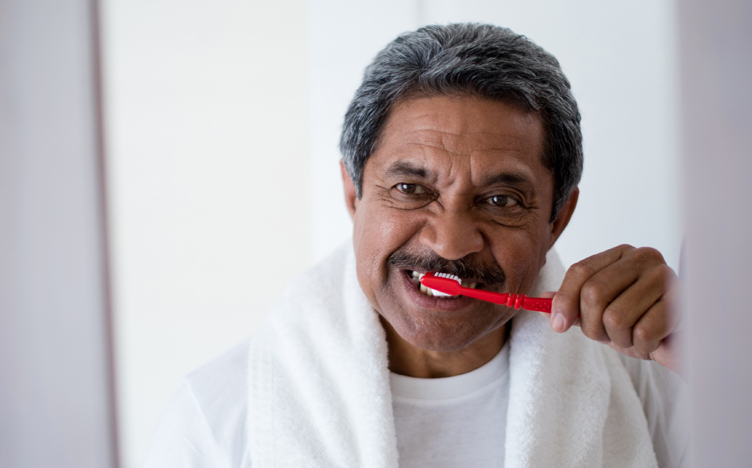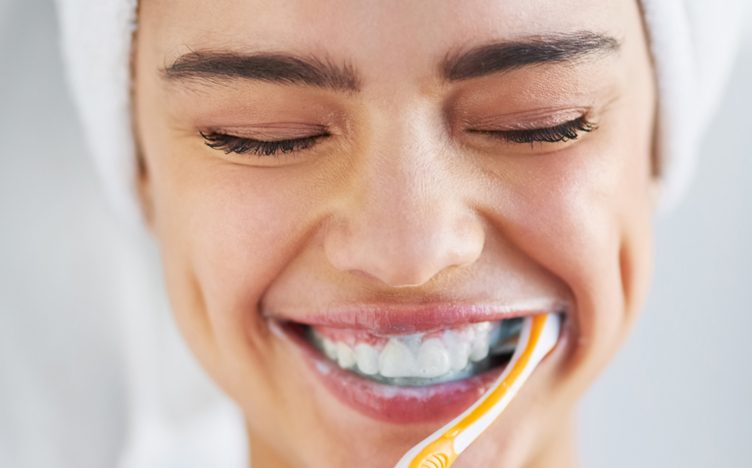About 1 in 6 adults over 65 have lost all of their teeth. As Baby Boomers age, the number of people in the U.S. age 65 and older will double to almost 80 million over the next two decades.1
Dental benefits
True facts about false teeth
Smokers are more likely to lose their teeth. In fact, 43% of older adults who smoke have no natural teeth.2
This can be a serious problem for the health and nutrition of people who have missing teeth or wear dentures. Because of their lack of natural teeth, they prefer soft, easy-to-chew foods instead of fresh fruits, vegetables and meats that require more chewing strength.
Fortunately, dentures have come a long way in terms of appearance, comfort and staying power, especially with breakthroughs in implant-supported dentures. If you’re one of the approximately 8 million older Americans who have none of their natural teeth,3,4 well-fitting dentures can restore your smile and improve your quality of life.
Your guide to thriving with dentures
Complete dentures — sometimes called full dentures or false teeth — are needed when all teeth are missing. These dentures come in two types — traditional and implant-supported dentures.
Traditional dentures
How they work
Traditional dentures rest directly on your gums and jawbone. The upper denture relies on suction from the roof of the mouth to hold it in place. The lower denture has little to no suction and relies on a tight fit and muscle control.
In the absence of teeth, jawbones shrink over time and traditional dentures get loose and need to be reshaped or replaced.
Types of traditional dentures
These are usually made in one of two ways:
• Conventional dentures are custom-made, fitted over several appointments and put in place about eight weeks after teeth have been removed and gum tissue has healed. Or they can also be a replacement for existing dentures.
• Immediate dentures are placed as soon as teeth are removed so the wearer doesn’t have to be without teeth for any time. However, they require more adjustments and are usually a temporary solution until conventional dentures are ready.
What to expect with traditional dentures
Traditional dentures usually require some adjustment.
• Your dentures may feel uncomfortable or loose (especially the lower denture) until your cheek and tongue muscles learn to keep them in place. Ask your dentist if a dental adhesive will improve the fit.
• You will likely need to adapt to eating since you won’t have the same stability and biting power as natural teeth. At first, chew slowly and eat soft foods cut into small pieces. Avoid sticky or hard foods, and don’t chew gum.
• You may have difficulty pronouncing some words at first, but it will likely only be temporary. It can help to speak slowly and practice enunciating words you find hard to say.
• You may experience some loss of taste. The feel of food in your mouth may also be different.
Traditional dentures are removed at night not only for cleaning but also to let gum tissues rest and prevent sores, infections and inflammation.
Implant-supported dentures
How they work
Implant-support dentures rest on surgically placed titanium posts in your jawbone and are secured with clips or fasteners. The number of implants you’ll need depends on the type of dentures. An immediate temporary denture can usually be placed after surgery. Implant-supported dentures typically require more visits to insert than traditional dentures. Placement and healing time will vary. Make sure you see a dentist who is skilled in restoring implants and works with an experienced surgeon.
Types of implant-supported dentures
There are two types of dentures that are supported by implants:
• Overdentures are removable like traditional dentures but are held in place by implants. Overdentures can sometimes also be supported without implants if some natural teeth remain.
• Fixed dentures are also implant-supported, but, unlike overdentures, they are made to stay in your mouth and cannot be removed at home.
What to expect with implant-supported dentures
Not everyone is a suitable candidate for receiving implants, which are generally far more costly and complex to place than traditional dentures. Implant-supported dentures will also require some adjustment, but they have advantages over traditional dentures, including
• Implant-supported dentures are more stable and comfortable, and they greatly improve speech and chewing efficiency.
• Implants in the jawbone can prevent additional bone loss.
• They don’t cover as much of the gums, so they may decrease irritation and increase taste.
• People report a better oral health-related quality of life and satisfaction with implant-supported lower dentures.
With implant-supported dentures, people with missing teeth can now eat and enjoy more foods.
Caring for dentures
Once you’ve revitalized your smile, make sure you maintain it by taking great care of your dentures, mouth and remaining teeth (if any).
• Remove traditional dentures and implant-supported before going to bed.
• Brush removable dentures every day with a brush and cleanser (not toothpaste) designed for denture cleaning.
• Brush your gums, tongue and palate with water and a soft-bristled toothbrush after removing and before inserting dentures or overdentures. If you have overdentures, carefully clean around the implant attachments, too, to maintain healthy gums.
• Keep removable dentures moist when not in use by soaking them in a denture cleaning solution or plain, but not hot, water. Rinse dentures thoroughly before putting them back into your mouth.
• Brush and floss fixed dentures every day, just as you would natural teeth.
• Maintain regular dental checkups. Your dentist will see if your dentures still fit properly and will examine your mouth to make sure it’s healthy. Ill-fitting traditional dentures may be a sign of osteoporosis, due to bone loss and weakness that can be detected by dental X-rays.
Traditional dentures continue to be a valuable treatment option. Increasingly, however, implant-supported dentures are becoming the treatment of choice, particularly for lower dentures. If your dentist recommends dentures, discuss which type may be right for you.
Whether you receive coverage for a portion or all of the cost of dentures will depend on your dental plan. Check to see what is covered under your plan so you don’t get hit with a surprise bill.












